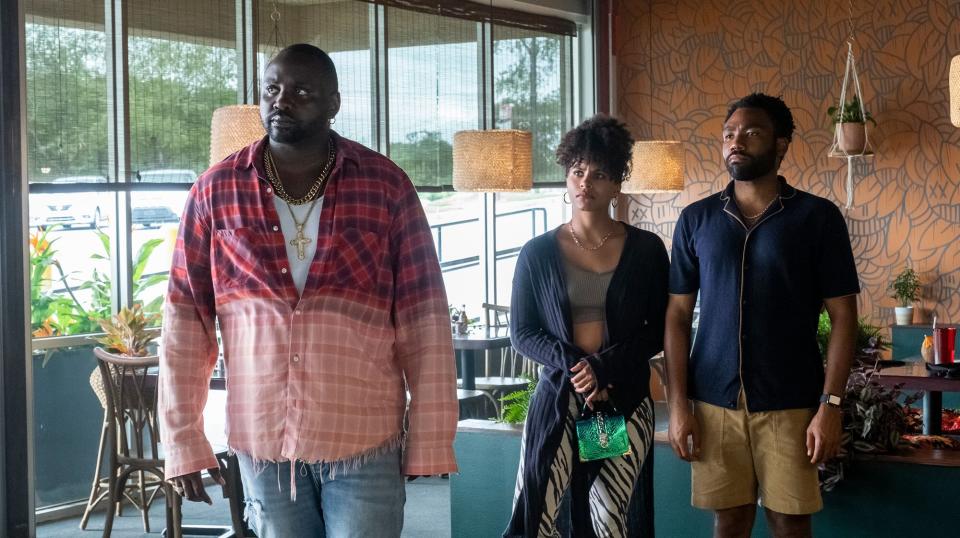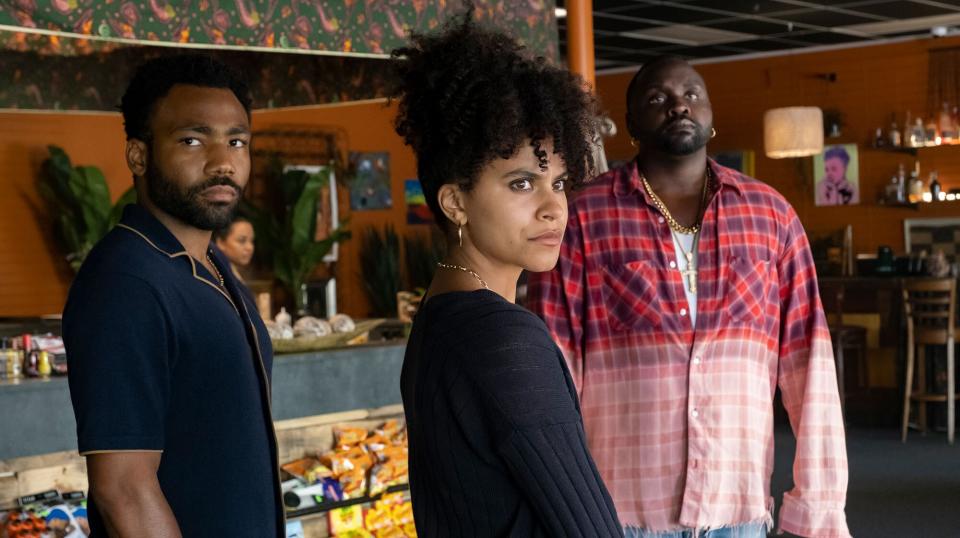Why was Atlanta 's finale so disappointing?

There's nothing worse than explaining comedy, but the funniest moment in Atlanta's last season requires investigation. Darius (LaKeith Stanfield) visits a sensory deprivation tank and loses track of what's real. Think Inception, except his spinning top is Judge Judy's butt. We follow Darius out of the tank through incidents that are strange, but not unusual, just regular Atlanta-strange. Then he wakes up, still in the pool. How long he was asleep? "About 30 minoots," says a worried assistant (Daniel Chung). What? "30 min-ooooooooooots," the guy repeats, floating backward.
Creator-star Donald Glover wrote on 30 Rock before starring in Community. That might be why Atlanta was a uniquely controlled mindbender, with a pinpoint craft that made other arty sitcoms look like never-ending bad indie movies. See how the light shifts around the assistant as he shrieks; marvel at the sea foam shades dappling Darius in the tank. This was a very funny, very beautiful TV series, and one of the greatest shows of the last decade. By comparison, its last two seasons were collectively just fine — which can only count as a major disappointment.

Guy D'Alema/FX Brian Tyree Henry, Zazie Beetz, and Donald Glover in 'Atlanta'
Season 2 was always going to be a tough act to follow, and "just fine" counts as a letdown from those heights. Mission drift is a problem for any TV enterprise, especially one full of young talents with multiple offers. In the hiatus, two Atlanta leads joined Bullet Train to play Smaller Face Than Brad Pitt On the Poster, while Glover signed on to remake Brad Pitt in Mr. and Mrs. Smith. Season 4 gave Earn two monologues, one sorrowful, another romantic. Glover didn't cut himself slack, even if Earn was always the fourth most interesting lead. But how did Atlanta squander Van? Zazie Beetz turned her early focal episodes into arguments for superstardom. The finale, "It Was All a Dream," made her a furrowed brow.
There were complaints about Beetz' ethereal presence in season 3, but I thought the character suffered more in this final run. Beware main characters who suddenly have acting aspirations; that's what happens when showbiz people run out of any ideas besides showbiz. Elsewhere, Van and Earn kept running into their exes, a subplot that would seem obvious on How I Met Your Father. You have to remember how crucial and refocusing Van once was. Here was a young mom with rough career prospects, punished for any delight she allowed herself. Everyone's crazy for "Teddy Perkins," but I'd put forward the Van-centric "Value" and "Champagne Papi" as defining Atlanta statements. She tries and fails to stay employed, then tries and fails to have a fun night.
Atlanta was always brilliant about money, and could make poverty look unaspirationally stylish. In hindsight, the last two seasons had less room for material like that. Alfred (Brian Tyree Henry) and Earn were now big deals. (The show is their rise with no fall.) You could sort of buy Darius as a tag-along whoever. But Van became a floating appendage. In season 4, we glimpsed no job, no friend group. Did the writers just not care anymore? Her closing season 3 monologue — "Who the f--- am I?" — sounded less like a confession than a defense of creative indecision.
Atlanta never really made a terrible episode, besides the Amelie one and maybe the D'Angelo one (which at least introduced "Young White Avatar" to the lexicon). Written by Glover and directed by defining collaborator Hiro Murai, the finale was a last demonstration of the hard things Atlanta did well. Out of thin air came new outrageous personalities: London (Naté Jones), macrodosing while chugging vodka out of plastic; and Demarcus (Calvin Dutton), a sushi dreamer with 10 thousand thoughts about Black communal self-loathing.
Season 4 repeated notes, though, with phantom-D'Angelo and a Tyler Perry-ish tycoon playing same-y mystery hermits. Atlanta's whole thing was skipping obvious plot points, but I never believed that the show entirely had a handle on Alfred's new life as a star. Earn's promotion up the management track felt more accurate, but a Los Angeles job offer was an obvious final-act decision point. This was suddenly a series that couldn't do easy things well, so the cousin dynamic — loving, suspicious, using each other while only really trusting each other — evaporated. The ambiguous closing scene just seemed silly, not really about anything beyond an obvious urge to seem ambiguous. Because I am a coldhearted cyborg, I did not enjoy "Snipe Hunt," the one where Earn and Van become Ross and Rachel. Like 30 Rock and Community before it, Atlanta always cleverly zigzagged expectations. So it will always be disappointing that this is the sitcom where the will-they-or-won't-they got together.

Guy D'Alema/FX Donald Glover, Zazie Beetz, and Brian Tyree Henry in 'Atlanta'
Conversely, Henry was always locked into Alfred's weariness. A typical rise-to-fame story finds a musician struggling with celebrity while yearning for the life left behind. Alfred was always suspicious of everything. He didn't like how local kids thought he was cool, and he didn't like how rich people treated him like a prize. (He may have hated his fans.) Henry by himself was an amazing ensemble, so the only season 4 episode I loved was his solo farm outing, also an ultimate showcase for Murai as a mood maestro. I really thought they were going to kill Alfred with a tractor, and I really thought they were going to kill Alfred with a wild hog.
One Atlanta critique argued the show was somehow traitorous, creating Black stories for a non-Black audience. Glover discussed this directly and approached it artistically; not for nothing did young Earn wear fake FUBU to school. My thoughts on this profound matter are wanted by nobody, since my choices for Atlanta cosplay are Justin Bartha and Socks. The show was certainly skeptical about the hashtaggiest version of Black Excellence, and had parodic fun with diversity as an empty corporate strategy. But at its best, Atlanta was skeptical of everything: billionaires, old friends, barbers, fraternities, lawyers, Tyler Perry, people who complain about Tyler Perry, Liam Neeson, people who complain about Liam Neeson.
This made the show vastly more interesting than any let's-pin-the-argument-down analysis. It's also why, beyond obvious sense, I way prefer season 3 to season 4. The European vacation promoted the gang to globe-trotting sensations, with tour clout ensuring zero consequences. Relatability went out the window. Everyone knows what it's like to struggle, but not everyone knows what it's like to be sad about success. Even less people understand the paradoxes of Black success, with the peculiar predatory-adoration feeling that so many white people love you for the wrong reasons.
So there was an edge of honesty in the champagne silliness — an admission that, yes, this was a show made by the guys who flew to Cuba on Bezos' dime to make a gaseously pointless musical whatever. Season 3 crosscut with homefront stories that mishmashed identity politics: a white kid raised Trini, a lightskinned bro desperate for Black scholarship funds. Complaints poured in about the anthologizing, but I think those structural shifts obscured the deeper issue that key characters were turning vague. Season 3 tried to be a concept album. With a return home and a renewed personal focus, season 4 aimed for back-to-basics. The result was, well, basic.
So what happened? Was Atlanta the Black-owned sushi restaurant, serving up delicious poison fish to no one while customers went to the Popeye's across the street? Or was the series more like Alfred on his European tour, searching for lost inspiration, worrying about selling out? In his lowest Amsterdam moment in season 3, Paper Boi passed out in a Goofy hat — and then season 4 revealed A Goofy Movie was a suicidal passion project for Disney's first/last Black CEO. Must mean something, since Atlanta returned this year as a tendril of the Disney behemoth.
You have to remember, this show debuted in a remarkable TV period. Its second season was one astoundment after another, funny-scary adventures that combined brazen absurdity with rap-Gothic thrills. That same year saw debuts for Killing Eve, Homecoming, Pose, Barry, You, Lodge 49, and Corporate, alongside standout seasons of The Good Place, The Good Fight, Dear White People, and Bojack Horseman. A lot of bold, paranoid, way-out-there wonders, defying normal rules of storytelling, challenging society's expectations. I'm not sure any of those shows were ever as good as they were in 2018. It's a different era now, and even Glover's off to reboot some IP. I pray all the creative minds who crafted Atlanta find a home for their talents in franchise-crazy, nostalgia-mad Hollywood. Without inspiration, it's just all about that paper, boy.
Seasons 1-2: A+
Season 3: B+
Season 4: B-
Related content:

